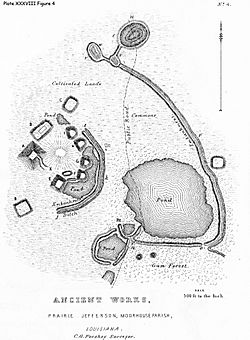Jordan Mounds facts for kids

Squier and Davis Plate XXXVIII Figure 4
|
|
| Location | Oak Ridge, Louisiana, Morehouse Parish, Louisiana, |
|---|---|
| Region | Morehouse Parish, Louisiana |
| Coordinates | 32°38′38.65″N 91°45′34.92″W / 32.6440694°N 91.7597000°W |
| Site notes | |
| Archaeologists | Tristam R. Kidder |
| Responsible body: private | |
The Jordan Mounds (also known as 16 MO 1) is an ancient site in Morehouse Parish, Louisiana. It is a place where people built many large mounds long ago. This site is very important for understanding the "Jordan Phase" of local history. The mounds were built between 1540 and 1685. This time is called the protohistoric period. It was when Native Americans first met Europeans.
Contents
What are the Jordan Mounds?
The Jordan Mounds site was once a very impressive place. It had seven large platform mounds. These mounds were built around a central open area called a plaza. There was also a village nearby where people lived.
The site was located near the Arkansas River. Today, you can still see an old channel of the river nearby.
Who Built the Mounds and When?
The mounds were built during the protohistoric period. This was between 1540 and 1685. This time began after the Hernando de Soto Expedition. This was when Europeans first explored the area in the early 1540s.
The people who built these mounds were new to this area. They might have come from the Mississippi River area to the east.
Why Were the Mounds Left Behind?
By the late 1600s, the Jordan Mounds site was no longer used. The people who lived there had left. This might have happened because of new diseases or big changes brought by the Europeans. These changes could have made it hard for their society to continue.
How Do We Know About Jordan Mounds?
The Jordan Mounds site was drawn in a famous book from 1848. The book was called Ancient Monuments of the Mississippi Valley. It was written by E. G. Squier and E. H. Davis. The drawing of the site is shown as Plate XXXVIII Figure 4 in their book.
In the early 1840s, Dr. Thomas P. Harrison and A.T. Hawkins Duvall bought the site. Later, in the early 1900s, an explorer named Clarence Bloomfield Moore tried to visit the site. However, he could not reach it. His steamboat, the Gopher, could not get there because there was no river access.
 | Selma Burke |
 | Pauline Powell Burns |
 | Frederick J. Brown |
 | Robert Blackburn |


